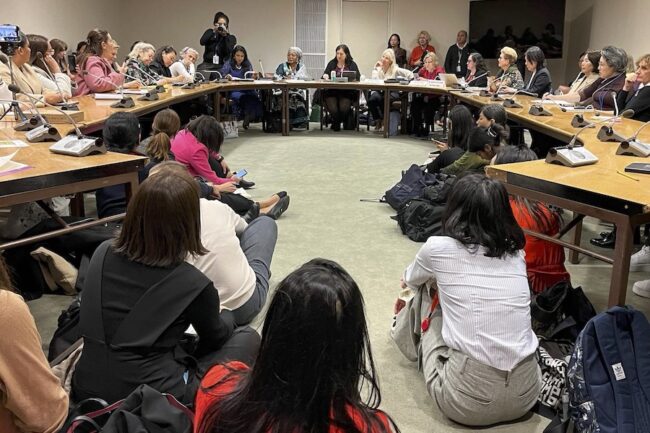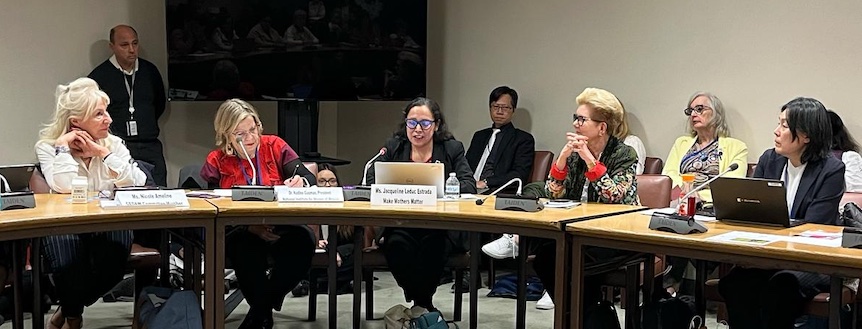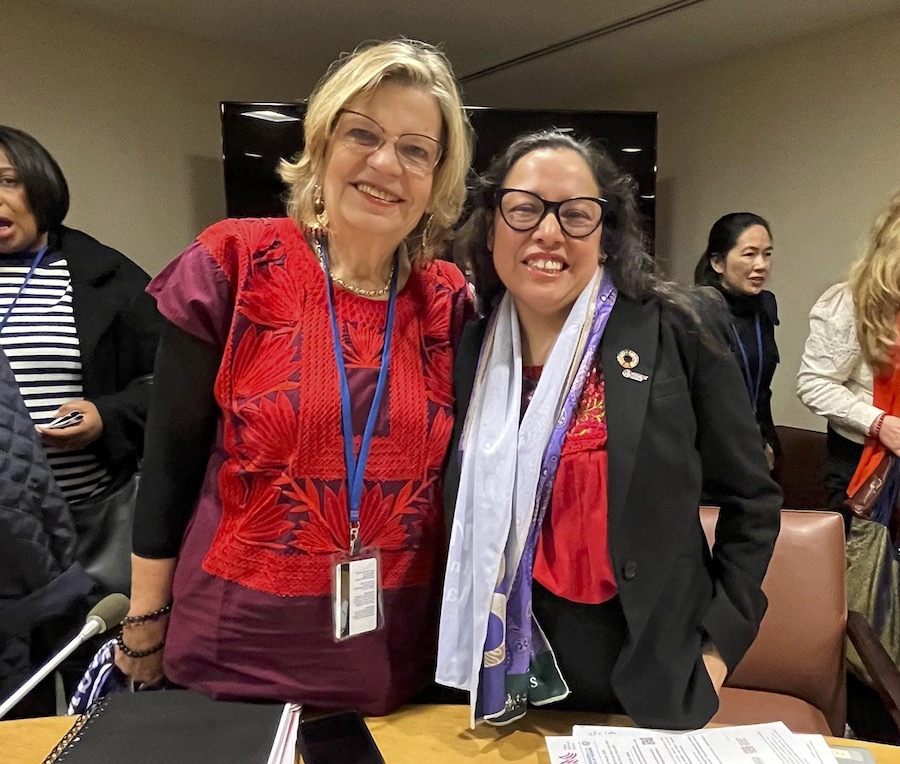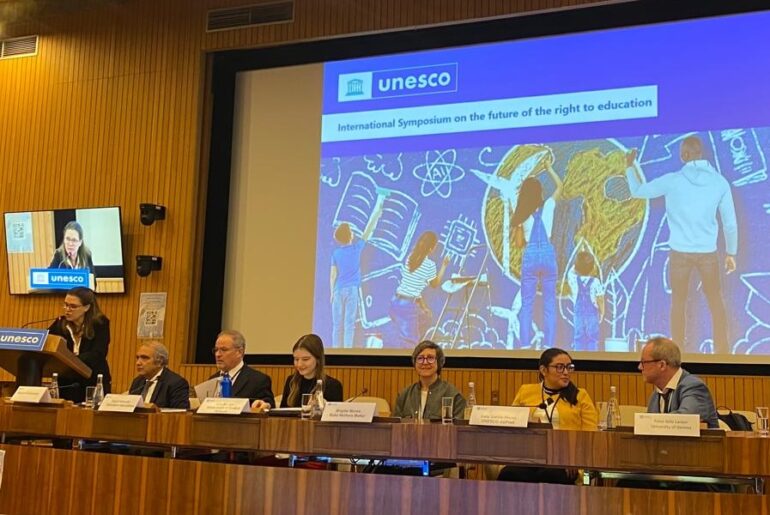Leveraging CEDAW to value and redistribute care work
02.05.24
UN New York, 68th Commission on the Status of Women - MMM was invited to speak at a high-level side-event organised by UN Women: “Building a future where care is valued and shared: Leveraging CEDAW to advance the care economy”. The objective was to discuss the economic and social imperative of addressing the unequal distribution of care work to advance women's rights, and how the UN Convention on the Elimination of All Forms of Discrimination against Women (CEDAW) can be used in this regard.

Introducing the topic, the moderator, Alia El-Yassir, Director of the UN Women Regional Office for Asia and the Pacific, offered a timely reminder that women spend on average 2.8 hours more than men per day performing unpaid care and domestic work. On the current trajectory, by 2050 women will still be spending 2.3 more hours per day on unpaid care work than men. The challenge is to accelerate progress, and build a future where care is valued and shared more equitably.
In her introductory remarks, Sima Bahous, UN Women Executive Director, highlighted the critical role played by CEDAW in advancing gender equality and all related issues, including care work: CEDAW promotes shared responsibilities within the family and recognizes the need to change harmful norms and practices.
She also noted: “Over the past two decades we have seen an increased recognition of how free-riding women’s unpaid and underpaid labour does not suit anyone but our global economy. We now know that care should no longer be reduced to a commodity, a personal choice, or a family obligation. It is high time to recognize it for what it is: a public good that generates benefits that extend beyond the individual care recipient to societies at large, and into the future when societies graduate from just utilising women’s unpaid and underpaid labour to collectively assume the costs of quality care for all”.
Esther Eghobamien-Mshelia, Vice-Chair of the CEDAW Committee, recalled that CEDAW provides entry points for addressing the care issue: articles 3, 11, 13 and 14 examine the intersections between the care economy and rural women, employment and social benefits. The Committee uses the national review process to advocate for care policy.
She also identified four structural issues with care that should help us identify where to act:
1) The failure to classify care at the household level as work, which leads to the undervaluation of care work and its invisibility in the economy
2) The social norms and constructs that traditionally assign caregiving to women, and situate them in the private sphere, which is outside of the macroeconomic framework – so care work is not work that qualifies for public expenditure
3) The non-remuneration of women’s contribution to the formation of human capital
4) The weak recognition of the centrality of care work and the fact that all the paid economy rests on the care economy.
These issues are perpetuated by economic models that fail to reflect and give weight to the functions of the care economy.
Nicole Ameline, CEDAW Committee member, explained that the CEDAW Committee is currently finalising its General Recommendation (GR) number 40 to ensure the full and inclusive participation of women in decision making systems. This GR is particularly relevant to the discussion on Care as its objectives are to change the vision, the perception of women both in public and private spheres and to change the power relations that underpin social roles.
For Rangita De Silva, CEDAW Committee Member, “Caregiving is never just about caregiving; it is a site of struggle over decision making, power and control. […] In order to transform the board-room it is important to transform the role that both men and women play in shared care responsibility in the family and in the home. The sexual division of labour in the home may not be the only cause of women’s poverty and powerlessness but it is a major factor.”
Rangita highlighted recent positive developments in Law making and jurisprudence, in particular:
– The explicit recognition of care as a right in the legislation of Ecuador, which has become the first country in the world to affirm the right of people to care, to take care of themselves and to be cared for, with the state being the guarantor
– A landmark ruling in February 2021 by a family court in Beijing, where a husband was required to pay his wife 50,000 R&B for 5 years of unpaid care and domestic work; the judge stated that housework constitutes intangible property values.
But for Rangita, we need a paradigm shift, “a transformative model that challenges deep rooted cultural assumptions about gender roles”. Economic arguments for gender equality are important but cannot override the necessary structural changes about women’s roles.
Nadine Gassmann, president of the National Institute for women of Mexico (InMujeres) reminded the audience that “the unjust time use and the current social organisation of care work undermine the civil, political, economic, social, and cultural rights of women and girls as well as their right to a life free of violence”. She called for addressing care as a human right, and as a public good, which entails the shared responsibilities of families, communities, the state, and the private sector.
She emphasised: “It is necessary for all of us to build egalitarian humanistic and feminist societies that place human wellbeing at the centre. This is the core definition of care societies as described in the Buenos Aires commitment (which was adopted by Latin American countries in November 2022). Moving towards care societies will empower women and girls to use their time freely and gain economic autonomy, while improving the economy and the lives of those who need care. […] One of the most important ongoing measures for the advancement of women is building a national care system that is universal, progressive and financially sound, acknowledging that care is not an expense but an excellent investment”.

Speaking on behalf of MMM, our UN representative in New York Jacqueline Leduc-Estrada called for a multi-stakeholder approach: in addition to governments, communities and private companies have a key role to play in recognising, redistributing and supporting unpaid care work.
Looking at grassroots organisations from our network working with and for mothers at the community level, we see that they mostly target mothers in very particular contexts and situations of vulnerability. They are also close to their beneficiaries, understand their needs, and are more agile and able to adapt to evolving situations. All this work is difficult for governments to do. But governments can support financially and help scale up.
Private companies also have an important role to play in supporting unpaid caregivers, and it is a win-win policy. The example of Danone shows that the parenthood and more generally the caregiving experience actually benefits companies as it develops organisational and other soft skills that are very much in demand in the labour market. It also shows that supporting mothers and other caregivers does bring measurable returns on investment, including improved productivity, talent retention, employees’ loyalty and attracting new talent. She also mentioned an initiative that MMM co-founded, and which was recently launched: the Be Family Movement aims to shift the paradigm, from families/caregivers adapting to companies to companies adapting to families/caregivers.
Jacqueline ended with a call to zoom out and take a cross-sectoral and multi-stakeholder approach to building transformative care and support systems. She urged the CEDAW committee to take the lead, join forces with other human rights Committees, and involve all stakeholders to develop a joint general recommendation.

Jacqueline, MMM Representative in New York, with Nadine Gasman, president of InMujeres Mexico
The New EU Gender Equality Roadmap : A Call for Inclusion of Mothers
04.03.25
The European Commission’s initiative on a new Gender Equality Roadmap post-2025, marks a significant step forward in addressing gender disparities across the European Union. Make Mothers Matter (MMM
Breaking the Cycle: Gender Equality as a Path to Better Mental Health
18.03.25
The Council of the European Union has taken a decisive step in recognising the vital connection between gender equality and mental health.
Europe Must Listen to Mothers: Our landmark report heads to the European Parliament
28.08.25
On 22 September 2025, the voices of mothers will take centre stage in Brussels. For the first time, Make Mothers Matter (MMM) will present its State of Motherhood in Europe








